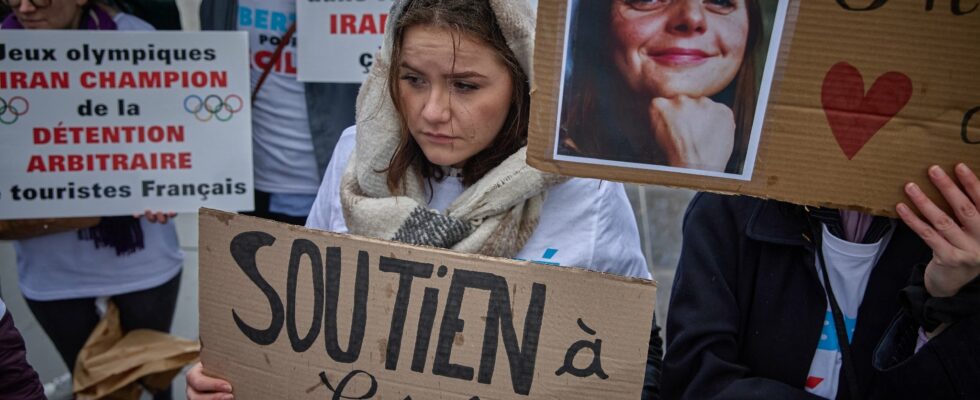The name of the third French hostage in Tehran has been revealed. In an interview with France Inter broadcast this January 13, Olivier Grondeau, arrested in October 2022 during a tourist trip, confides his dismay while he is serving a sentence for “espionage”. Two other French people, Cécile Kohler and Jacques Paris, have also been detained since 2022. They are not the first to be used as bargaining chips by the Tehran regime, which, since its advent in 1979, has practiced “diplomacy”. “hostages one of the essential elements of its destabilization strategy.
On January 10, the Quai d’Orsay called on Tehran to release all French nationals taken hostage by the Islamic Republic, while formally advising against traveling to the country. If Olivier Grondeau comes out of silence, it is also because the official means of action are limited. One week before the inauguration of Donald Trump – who probably risks choosing to apply maximum pressure – the Iranians are careful to retain all the means of pressure that remain to them. Because in reality, the Europeans today have very few levers to free their hostages.
This strategy only has advantages for Tehran. First, regain control of Iranians imprisoned in Europe. Without this bargaining chip, many Iranians close to the regime would still be in jails in the Old Continent. Iran announced the release of Mohammed Abedini, an Iranian arrested in Italy, four days after the release of Italian journalist Cecilia Sala.
This means of pressure above all allows Tehran to avoid the classification of the Revolutionary Guards, the central organ of the regime, as a terrorist organization. While many MPs in Strasbourg say they are in favor of classifying the organization on the list of terrorist groups, a very strong demand from opponents of the Islamic regime, nothing is moving forward in this direction. And for good reason: to be able to obtain this ranking, unanimity of the Twenty-Seven would be required. Almost impossible to get, in particular because of this hostage “diplomacy”, confides a European diplomat. “The technocrats in Brussels refuse to do so,” notes Emmanuel Razavi, author of The hidden face of the mullahspublished by Editions du Cerf, “out of panic over the question of the hostages, whom they fear will see languishing in Iranian jails – at best – or even be executed.” Last October, Iranian-German dissident Jamshid Sharmahd, detained since 2020, was executed.
Therefore, countries which have nationals in Iran will never be ready to take the risk of enacting the classification. Especially since most of the important members of the Revolutionary Guards are already subject to individual sanctions, the measure would be above all symbolic. But at a time when the Nobel Peace Prize winner Narguess Mohammadi is undergoing treatments that endanger his health and the Islamic Republic has a sad record for the number of executions under the death penalty (901 people in 2024, according to the United Nations High Commissioner for Human Rights), the European Union could use the power of this symbol. Especially since negotiations on the Iranian nuclear issue resumed in Geneva on January 13.
With regard to the Islamic Republic, the EU’s obsession has long been to maintain a line of dialogue, particularly in order to avoid an escalation of this program. One element could nevertheless decide the Europeans to increase pressure on the Islamic Republic: the alliance between Moscow and Tehran. As the three years of the war in Ukraine loom, Europeans know that the logistical support from Tehran to Moscow, notably via drones, and the “alliance of evil” between Moscow, Tehran and Pyongyang, allows Russia to maintain the conflict. Attacking Iran today could indirectly send a strong message to Russia.
Avril Haines, head of American intelligence, warned at the beginning of December about this Russia-Iran-North Korea alliance, particularly on the nuclear issue. Before the Council of Foreign Relations think tank, she affirmed in particular that the risk of nuclear proliferation was increased due to this alliance. Indeed, if until then the Russians also wanted non-proliferation, their alliance of circumstance with these regimes could make them likely to recognize the status of nuclear power of the North Koreans and not to prevent the Iranians, who according to American intelligence has enough to manufacture twelve nuclear warheads, to acquire atomic weapons. A sufficiently worrying prospect to shake Europeans out of paralysis?
